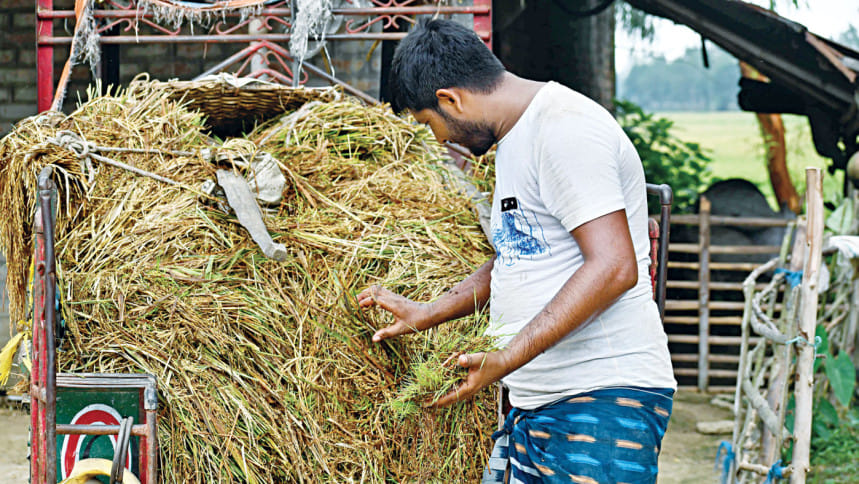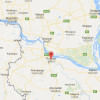Boro farmers’ capital washed away by rains, floods

"I could not harvest the paddy of a single bigha and as the storms continued after Eid-ul-Fitr, all my crops have gone underwater. I wanted to harvest them earlier but the severe labour crisis and over price of harvesting stopped me," a farmer said
Thousands of farmers who lost their paddy this Boro season due to excessive waterlogging amid untimely rain and a labour crisis in the country's northern region, including eastern Sylhet and Chalan Beel, are worried about the upcoming Aman season as many of them have lost their capital.
According to the Department of Agricultural Extension (DAE) in Sylhet, around 8,852 hectares of paddy across six districts in the region have been affected by flooding while the damage to other crops has not been assessed yet.
However, farmers say the amount of paddy damaged in the first phase of flooding is actually higher than the amount quoted by the DAE.
Farmers in the Chalan Beel area of Pabna, Sirajganj and Natore say that around 40 per cent of their paddy crops remain unharvested as most of the fields have been submerged by rising water levels.
The recent rains following Eid-ul-Fitr affected 4,377 hectares of paddy in Bogura and 18,996 hectares in Joypurhat. Of the crops damaged, 418 hectares of paddy in Bogura and 408 hectares in Joypurhat were completely ruined, costing farmers about Tk 8.03 crore in Bogura alone, DAE officials said.
However, farmers argue that the real amount of damage is eight to 10 times higher than the DAE estimate.

Abdur Rouf Mondal, a farmer of Rajosh village under Gobindaganj upazila of Gaibandha, said every farmer in his village lost at least one or two bighas of paddy due to excessive rain which caused severe waterlogging after Eid.
"Many were farming on leased land taken through loans to cultivate Boro and make a profit but they lost their investment due to the storms. So, many farmers will not be able to cultivate Aman," he added.
Mondal went on to say that farmers pay about Tk 5,000 to lease one bigha of land for one season while it costs more than Tk 8,000 to plant the paddy and another Tk 8,000 to harvest it.
Considering this year's bad weather, many farmers were forced to reap their paddy early, when they were still unripe. As such, yields were lower as each bigha produced only 20-26 maunds of paddy worth about Tk 650-700 per maund (37 kilogrammes).
"So how will they cultivate Aman paddy after incurring such loss?" Mondal asked.
During a recent visit to more than 10 villages under Vatra union of Nandigram upazila in Bogura, this correspondent found that around 300-400 bigha's paddy had been damaged by waterlogging.
However, the upazila agriculture officer said only 61 hectares of paddy were completely ruined.
Md Mostafizar Rahman, a farmer of Kumira village who cultivated 22 bighas of Boro paddy this season, lost everything after his paddy became submerged amid heavy rains.
"I could not harvest the paddy of a single bigha and as the storms continued after Eid-ul-Fitr, all my crops have gone underwater. I wanted to harvest them earlier but the severe labour crisis and over price of harvesting stopped me," he said.
If Rahman wanted to harvest his paddy before the rain took its toll, he would have had to pay about Tk 7,000 to Tk 9,000 for each bigha as labour cost.
As such, he would require more than Tk 180,000 just to harvest his fallen crops and considering the price of wet paddy, he decided against it.
"But if I harvested my 22 bighas of land I could have earned at least Tk 60,000 but now I have lost everything and am feeling destitute," he said.
"Only the government can save me now by providing some subsidy or financial assistance," Rahman added.
Musa, Rahman's eldest son, alleged that his farther has been acting irrationally after losing his paddy fields.
"We are trying to convince him that all six members of our family will work together to minimise the loss," he said.
Md Emdadul Haque, a farmer of Bamonia village in Shajahanpur upazila of Bogura, said three of his four bighas of paddy remain unharvested as the fields became waterlogged in addition to high labour costs. "I cultivate leased land by taking each bigha for Tk 12,000 per year and considering the damage this season, I could incur losses of over Tk 50,000," he said.
"If the government does not help us then we will be unable to cultivate Aman paddy as farming is no longer a profitable profession. So, we are expecting a handsome compensation or subsidy for Aman paddy in the upcoming budget," Haque added.
Ashraf Mithu, another farmer of the area, said he had taken loans from a local non-government organisation to cultivate two bighas of Boro paddy but lost most of the crops due to rain.
"Now I am worried about repaying the loan," he added.
Asked about the possibility of compensation or subsidy, Md Anamul Haque, additional deputy director of the DAE in Bogura, said it depends on the government's decision.
"If the authorities wish, they can provide subsidies to the affected famers for Aman cultivation," he added.

 For all latest news, follow The Daily Star's Google News channel.
For all latest news, follow The Daily Star's Google News channel. 








Comments